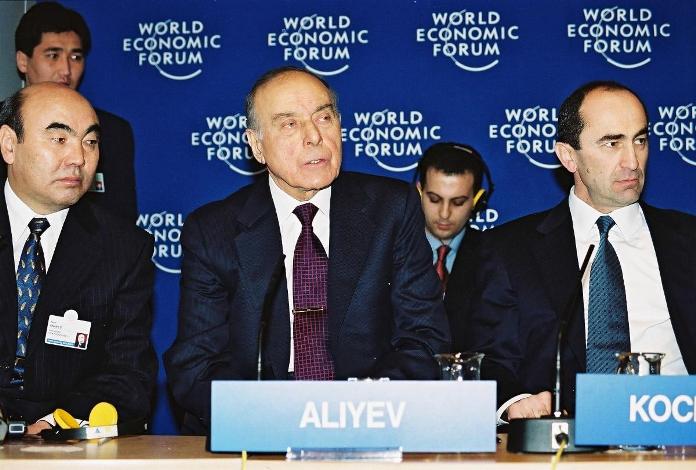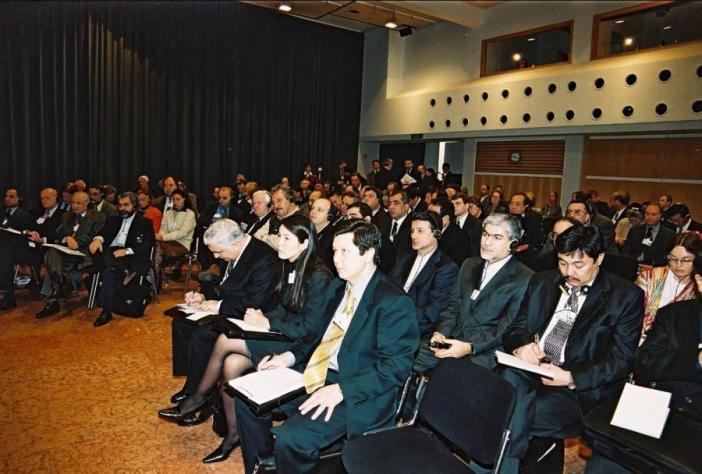

(President of Azerbaijan Heydar Aliyev, President of Kyrgyzstan Askar Akayev, President of Armenia Robert Kocharyan, Prime Minister of Kazakhstan Gasumjomard Tokayev, minister of foreign affairs of Turkey Ismayil Cem, minister of foreign affairs of Iran Kamal Kharrazi, as well as, over 500 politicians, businessmen, diplomats and other figures attended the session)
Ladies and gentlemen!
I thank the organizers of Davos Economic Forum for bringing the restoration of the Great Silk Way to the agenda of discussions in this forum. It is a natural phenomenon to some extent and reflects the reality of the present day.
The Great Silk Way has left traces in the history of mankind, especially in the history of the Eurasian continent and it played an important role in the transport of goods between Europe and Asia.
In the past century, beginning from the 1980s this problem has become topical and it is very remarkable that this initiative has been proposed in most countries. That is why, today a lot of countries think that the Great Silk Way diplomacy is their proposals. However, meanwhile we should remember the decisions of UNESCO on this issue, in 1980 and in the years to follow. The real restoration of the Great Silk Way became possible only after the collapse of the USSR and after the independence of countries in the Southern Caucuses and Central Asia. Otherwise, restoration of the Great Silk Way would be impossible and unreal.
The European Union founded this project by proposing TRACECA program. However, since 1993 the process has been improving slowly. The opportunities for the intensive development of the energy resources in the Caspian Sea and active contribution of the European countries, the USA, Japan, and other countries besides the littoral states made it possible to establish the Transcaucasia highway.
For the first time we - Uzbekistan, Turkmenistan, Azerbaijan and Georgia signed a quadrilateral agreement in Sarakh of Turkmenistan in 1996 - opened this highway. Since the speed of the cargo transportation has increased due to the Transcaucasian highway. If in 1996 2 million ton cargo was transported through this corridor, now it has reached to 5 million tons. This is only the beginning. There are great perspectives.
From this point of view the international conference on the restoration of the Great Silk Way and realization of TRACECA program, which was held in Azerbaijan, Baku, in 1998 jointly with the European Commission, had an important role in this issue. Representatives of 32 countries and 13 international organizations attended this conference. We adopted a special agreement on that issue, 12 countries signed it, and now it is being implemented. Permanent Secretary for the implementation of this program is located in Azerbaijan, in Baku.
However, I repeat, the active development of energy resources in the Caspian Sea gave a great impetus to all these improvements. INOGATE program, program of the European Union on the diversification of the pipeline routes were also connected with this issue. At present big oil and gas deposits in the Caspian Sea, in its Azerbaijani, Kazakh and other sectors are being developed. We have got concrete practical results.
Construction and operation of Baku-Novorossiysk and Baku-Supsa pipelines have already been completed, the program on the construction of Baku-Tbilisi- Ceyhan pipeline over 2000 km in length has already been adopted. All these - transportation of oil and gas cargos of Eurasia, of course, make the restoration of the Great Silk Way real. We are at the beginning stage of that process and I think that this is the most urgent problem both for Eurasia and for the whole world. Thanks for your attention.
Answers to the questions of the participants of the session
Question: I want to know about the idea of peace pipeline that is going to pass through Azerbaijan and Armenia. President Heydar Aliyev drew attention to it in the past. Is it possible to revive this idea? Messrs. Presidents, I am addressing to you: is this peace pipeline included to the Silk Way program?
Heydar Aliyev: Firstly, it is the first time that I hear this term - «Peace pipeline». There was «Friendship» pipeline in the USSR, but «Peace pipeline» is your invention. We have already started the development of oil deposits in the Caspian, there are huge oil and gas reserves. By the way, some in the West, East, in Russia, and in Europe write that oil and gas reserves in the Caspian have been exaggerated. This is completely falsehood. It is already 50 years that Azerbaijani oilmen, geologists, and scholars have been working in the Caspian Sea and we have studied the real opportunities sufficiently. That is why, what we have presented to the world is real. This is the first point.
When we started the implementation of the «Contract of the Century», the first project which Azerbaijan signed with a lot of companies of Europe and the United States in 1994, we faced the pipeline issue. We were not against the construction of this pipeline through Armenia and Turkey to Ceyhan. We were not against the construction of this pipeline through Iran either. However, our proposals were not realized. First of all, Armenia and Azerbaijan are in conflict. The Armenian armed forces invaded 20% of the Azerbaijani territory, through which this pipeline had to pass, and in the negotiations we proposed to the Armenian side to put an end to the conflict on the basis of the international law and to construct this pipeline. However, they answered that they did not want to exchange the land with the pipeline, although the issue was not put like that. The situation related to your question about failing of the peace pipeline is like that.
Later, as a result of our efforts, the project of Baku - Tbilisi - Ceyhan was created. We signed an agreement in November, in Istanbul on construction of this pipeline. Preparatory works are under way and this project will be realized.
Question: I want to ask a question about the transportation of oil by pipelines. Today, the price of oil is very high, although 12 months ago it was very low. Would you like to interpret the issue related to the prices? Which advantages does it give you in terms of converting oil price into money and of resources that you can use in this region?
Heydar Aliyev: We do not regulate oil prices. We are just subjected to the price conjectures. Yes, a while ago the price of oil fell, now it is high. As far as we know, this inclination will remain. However, it is not a new phenomenon for the oil world. If you have a look to the history, for example, to last 30 years, you will see that there were times both the price of oil was low and high. That is why, the pipelines are completely subject to profitability.
Question: Does it mean that if the prices of oil increase, you will be able to realize some of your infrastructure projects?
Heydar Aliyev: Even if oil prices do not rise more than those of today, our oil projects will be realized. Even if prices fall, they will be realized, since we know that prices will rise later again.
Question: My question is to the Azerbaijani and Armenian Presidents. How do you imagine the perspectives of the resolution of the conflict between the two countries? Is there any opportunity to come to an agreement related to Nagorno Karabakh? Another question, can Armenia think about leaving the Azerbaijani territories after the resolution of this conflict?
Heydar Aliyev: Resolution of the Azerbaijani-Armenian conflict over Nagorno Karabakh is vital both for Azerbaijan and Armenia. In 1991, when Azerbaijan got its independence, it was already in the state of conflict. As a result of this conflict, which expanded and transformed into war, territory of Nagorno Karabakh and the adjoining territories were invaded and it is 20% of the Azerbaijani lands. One million Azerbaijanis were forced to leave their lands, and the districts, where Azerbaijanis used to live, were destroyed and robbed.
In this condition we are for the solution of the conflict peacefully and we signed a ceasefire agreement with Armenia in 1994. Both Azerbaijan and Armenia have been obeying this agreement until now. Recently, for example, during the last year direct negotiations, meetings, and dialogues were held between the Azerbaijani and Armenian Presidents. I hope that it improves the issue in the direction of the resolution of the conflict peacefully. We want the peaceful resolution of the conflict. We want the liberation of our lands, occupied by the Armenian armed forces. We want our citizens to return home - currently they live in tents. We want peace with Armenia forever.
Question: I want to say that not only President Shevarnadze, but also Mr.Putin is not here. Putin has refused to attend Davos, although his participation would be necessary. That is why, my question is firstly both to Heydar Aliyev and minister of foreign affairs of Turkey: Your countries are blamed in supporting the Chechen separatists. What do you think, how soon the conflict in Chechnya can be solved? How would be the solution of this conflict in nearest future? If anyone of the Presidents and prime ministers wants to answer this question, I will be happy to hear them.
Heydar Aliyev: There are regular accusations against Azerbaijan in mass media that Azerbaijan assists Chechnya in different fields. These accusations does not have grounds, they are groundless and libel. When I was in Moscow, last time, we had an open conversation with Mr. Putin, who was the acting president then. Mr. Putin confessed that it is not the position of the Russian state, mass media is free and they write what they want. Additionally, he said to me that they would put an end to the Chechen problem. It is an answer to your question.
Question: Will Azerbaijan and Armenia hold any bilateral negotiations here in Davos?
Heydar Aliyev: Yes, we are thinking about holding bilateral negotiations. Meeting date of the Azerbaijani and Armenian Presidents has already been determined.